Tony Jacklin – Captain Fantastic
Tony Jacklin’s foresight and inspired leadership qualities set in motion a chain of events and a series of spectacular European victories that effectively led to the Ryder Cup becoming the commercial event it is today. Richard Gillis talked to him about the opportunities it brought along
Along with a certain Seve Ballesteros you were overlooked as a player for the matches in 1981 – did it come as a surprise that you were then invited to be captain in ’83?
Totally. I wasn’t picked in ‘81 and – to add insult to injury – they asked me to go along as an official. Naturally I told them to stick it in their, er, ear. I was in 13th place in the table and they picked Mark James, who two years previously had been levied the biggest fine in PGA history for his behaviour in the 1979 Ryder Cup at The Greenbrier. I don’t forget these things. At a time when he was arguably the best player in the world, Seve was left out, too, as he was involved in a row over appearance money. So if I was teed off, he was even more so.
Tony Jacklin – Captain Fantastic
What do you remember of the invitation to take up the role in 1983?
Ken Schofield approached me with Colin Snape while I was hitting balls up at Moortown. I was shocked, to tell you the truth, and told them I couldn’t answer their question on the spot and that I’d see them the next day. I thought about it that night. My first instinct was to tell them to stuff it but I could see there was an opportunity to make the changes that I knew needed to be made. I knew how organised things were in America and how disorganised things were here. I always felt that we were second-class citizens.
How can you compete on the same level if you are treated poorly?We were flying in the back of the bus, not knowing who was paying for the bloody dry cleaning, not being able to take caddies with us – everything was about what we couldn’t do. The attitude of the PGA was that it’s always been done this way so why did it need changing. The first thing I said was that as the Americans travelled on Concorde we would be, too. I insisted on the best of everything.
Who was running the Ryder Cup then?
The PGA ran the whole shebang. They’d secured headquarters at The Belfry and they were doing their best as they saw it to furnish the team and put up a show but it was being done on a very unprofessional basis. The Americans stood there like Gods in their jackets and leather golf bags, they came off the plane with a supreme confidence. We were standing on the tee two shots down before we’d hit a ball.
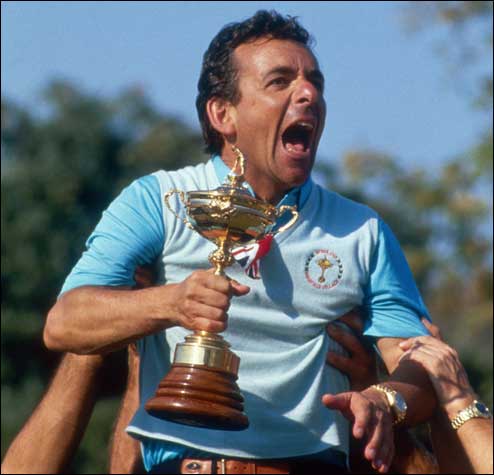
Tony Jacklin – Captain Fantastic
What other initiatives did you bring in terms of managing the team?
I wanted a team room where we could relax – there was nothing like that before. Any meetings we had were invariably around the locker-room when the captain could get you all together. Then we’d all clear off and be left to our own devices. I didn’t think that was how you created the team atmosphere we needed. We had the team room stocked so there was no need to go anywhere else and once you supplied it the players didn’t want to go anywhere else anyway.
Tony Jacklin – Captain Fantastic
What did you learn from previous captains you had played under?
Certain captains became aloof, they became different people and didn’t connect to the team at all. I made it my business to have a one to one relationship with every single player whether it was Faldo, Seve, Langer or Lyle. The first challenge in ’83 was the ego thing – players had to leave egos at home. The brief was to win the Ryder Cup. We were not trying to make friends, we were going to shake hands and look the other guy in the eye win, lose or draw. But let’s do everything we can to get the job done.
Were there restrictions on how you could commercially exploit the role of Ryder cup captain?
[Laughs] The length and breadth of my commercial involvement was with Johnnie Walker, who wanted to make some of their lesser markets in Europe aware of what the Ryder Cup was and they said would I get on an aeroplane and go to Italy and talk about the Ryder Cup. But I never got any other commercial opportunities for the whole four times I did it. I might have made £20,000 from Johnnie Walker, and they probably sent me a case of whisky, but nothing else was available at the time. It was a case of people couldn’t believe what was going on and how important the Ryder Cup was becoming and by the time they did believe it I had finished.
Has that changed?
[Laughing] I would think there’s a million pounds in it for anyone doing it now. Where it’s all gone is mind-boggling. The sheer cost of staging the Ryder Cup now is vast.
When did you sense that there was momentum building around the Ryder Cup and the captaincy itself?
Obviously 1985 was the first win for 28 years and everyone was excited that we won, but I wouldn’t say it it changed the climate in terms of the commercial opportunities.
What do you make of the role now?
The world turns, nothing stays the same, nor should it. If these lads can make it work financially, why wouldn’t they? Nothing’s for free, they still have to show up for the sponsors, be there for the photograph sessions or whatever it is they do. And next time it will be more and more and more. They are now setting out their table for these things I just wish someone had set the table out for me.
Why do you think you didn’t make as much of the commercial side of the captaincy as you might have done?
Well, for one thing the Cup itself simply wasn’t the big business it is today. But on top of that I was pretty poorly managed. I left IMG in 1983 because I was dissatisfied with what was going on, they weren’t interested in it [the Ryder Cup] at all. They treated it like it was a non-starter and then it took off and grabbed their attention so anyone who then did the captain’s job was hooked into the commercial aspects of it with them for the most part.
What was your issue with IMG?
At that stage in my career I was obviously past my best as a player. I effectively stopped playing in 1982 after I’d won the PGA Championship [at Hillside] because I just wasn’t enjoying it, my putting was driving me mad, and I thought I just can’t do it anymore. So in ’83, I accepted the Ryder Cup job, and in order to keep an eye on things I started to do television and worked for the BBC – that was the best way I felt to keep abreast of what was going on.
I didn’t realise when I signed up with Mark McCormack that it was about him and not me. On reflection, I should have based myself in America when I won my two majors, there is no doubt about that. I had a tie up with Sea Island, but that was the only affiliation I had. IMG priced me out of the market and I never got another club affiliation in America. All the time McCormack was encouraging me to stay in Europe – but not for my sake, for his.
To drive IMG in Europe?
Absolutely. It’s clear now but it wasn’t clear then because I was too busy getting my head down, trying to be all things to all people. I even went and lived in Jersey [shaking his head] which was like living on this table. For a golfer that’s international I should have been Stateside where I could have made an intelligent schedule and stuck to it, supported golf in Europe but made America my main focus. But I was being fed different stories from Mark’s end.
What was his argument for you to stay in Europe?
Because I was European, and that’s where I should be. It came to a head in the late ’70s, when they [IMG] came to me and asked me to go to South America for an extended visit to play five events, saying that I could take the family. We started off in Argentina and went to Chile and Venezuela. The fee was $20,000 for the five events plus expenses for my wife and two kids. At the first tournament I sat and had dinner with Tom Weiskopf and I said, what’s your deal? And he said I am getting $35,000 for this one and I’m coming back for the last one and getting $35,000 for that one, too. And when he wasn’t there Trevino came down on the same deal. Tom wasn’t even an IMG client like me, it was just a one-off thing for him. I’d won two majors and he’d won one. I won the fourth event and I said stuff this and went to Barbados and rented a house for three weeks with the kids. IMG weren’t too thrilled about this but you can imagine how I felt. There was no loyalty there so I just left.
So the privilege of being Ryder Cup captain didn’t open as many doors as it might have done had you had the representation you had hoped for?
Exactly. I was seen as the dissenter, the guy with a mind. Was I annoyed? Of course I was. It became a stand-off from their point of view. It didn’t help that I was living in Southern Spain during that period and was out of the loop.
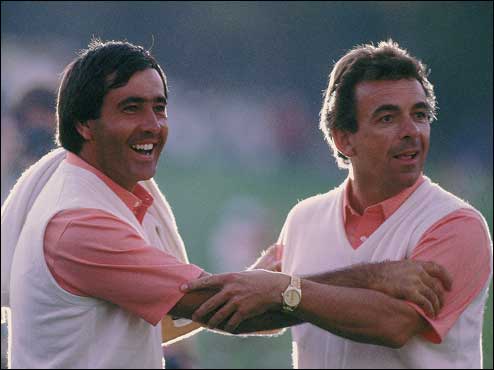
Tony Jacklin – Captain Fantastic
Is Faldo captaincy material?
He’s got all the experience necessary and has had time to see how it all works. He’s a highly intelligent fellow. He won’t leave anything to chance and he’s got good people around him. He made a determined effort to build the Faldo brand when he stopped playing. It works beautifully for him. It’s a great platform from which he can move forward. I think he’s mellowed over the years. He did what he had to do to get the job done – and he won six majors. He gave little thought to what people said, but that was his way. I wish him well.
It could be said that there are parallels between your experience (i.e. taking over a team that had become used to losing) and that of the Americans now – the tables have been reversed.
Paul Azinger is neighbour of mine in Bradenton and he’s a member of The Concession [the course designed by Jacklin and Jack Nicklaus] and we play a fair amount of golf together. Paul is a very determined individual and he takes no prisoners. I remember going up to him in ’89 at The Belfry to shake his hand and he was quite reticent to do it. He would have been very happy to go down the “we’re not talking” route. He’s shaking up their side in the same way I did ours. He recognised the US didn’t have their best 12 on show last time out. He now has four picks, which could ultimately prove to be very important.
The qualification is on strokeplay which is completely different to matchplay. Do you see any natural match players among the Europeans today?
You’re right. There’s a huge difference in mindset. A good example in my era was Manuel Pinero – he’s tenacious, like a terrier. I wouldn’t bank on him necessarily in a strokeplay event but he beat Lanny Wadkins in 1985, who was one of their big hopes. Pinero jumped sky-high when he knew he was playing him, he was totally sure in his mind that he could beat him and he did.
Darren Clarke would be in my mind as a born match player. What he achieved last time after all he’d been through was magnificent.He’s won a tournament recently, he would rise to the occasion and is capable of anything. We know he loves matchplay – he beat Tiger in the World Golf Championship event a couple of years ago.
Monty?
Monty is passionate about the Ryder Cup and would be on my shortlist, as Langer was always on my shortlist. There are certain players who rise to the occasion.
How influential is the captain?
I’ve got a film somewhere which shows Lee Trevino saying it doesn’t matter who you put with who, which in my mind is total bullshit. In a team game it absolutely does matter who you put with who. Look at what happened when Hal Sutton put Mickelson and Woods together – it didn’t work. It was naive to think it would. But Sutton did it. I don’t know the personalities of today’s players well enough to suggest likely pairings – that is Faldo’s job. And it’s mighty important to get it right. I remember in ’85 with Faldo, he was going through a divorce and going through a lot emotionally. I went up to him after he played with Bernhard Langer in the morning and said you don’t look comfortable. I said ‘am I going to put you out with Bernhard or am I going to put Ken Brown out with him’, and he said put Ken out. This told me this was a man I could rely on, the team is more important. I don’t agree that you should put the long-hitters and short-hitters together in the foursomes. Bullshit. They’re all pros, they know how to get the job done.
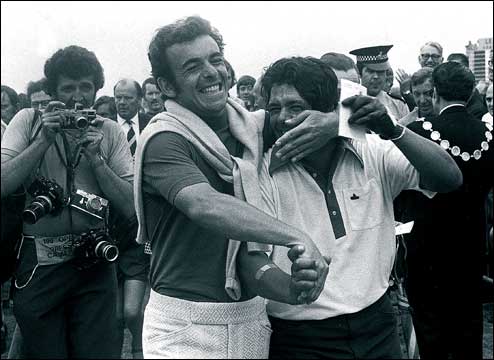
Tony Jacklin – Captain Fantastic
So their personal characteristics are more important than their characteristics as a golfer?
Golf is at least 95% mental. Once you can play, it’s all about how they’re thinking. Tiger is the ultimate example. Everyone in the world thinks that if they could hit the ball like Tiger then they could win tournaments like him, which misses the point entirely. Tiger wins the way he does because he thinks the way he does. He is mentally untouchable. And, of course, he he makes more putts than anyone else.
What do you think about Tiger’s absence this year?
I don’t think Tiger’s that important and I don’t think his absence diminishes America’s chances one iota. Like I said, they’re coming into this like we did in the early 1980s, they’re on home ground, and the Zinger wants more than anything in his life to stop the rot. I thought there was more camaraderie in the last Presidents Cup team [when Woods was absent through injury] than any other American team I’ve seen ever. If they can bring that to the Ryder Cup they will be a real threat.
The American way over the years has been very selfish. They’ve all got their own jet standing outside, they go when they want and come in when they want and don’t mix if they don’t want to. Their world is exactly how they want it all the time and they don’t want to share. Teamwork is about sharing.
What about the singles?
Obviously a lot depends on the situation going into the last day. But my overriding instinct is that I want my top players out in the top half, putting points on the board. I remember at West Palm Beach in ’83, I flipped everything over. Joe Black [President of the PGA of America] was there when me and Jack opened our envelopes and showed the team and he said “you can’t do that” because he saw that Seve was up the front and the power was at the top. Tradition had always been that you put your best players at the end, like we did in 1969. Historically that was seen as the way to do it. The fun for me was trying to outwit the opposing captain.
Can you see a time when they host the Ryder Cup outside Europe? Dubai is an obvious example.
Maybe. After we won in ’85 I was adamant the game should go to Spain – but not to Valderrama. It should have gone to Madrid, but unfortunately Madrid didn’t have the right course. I’ve always believed in fair play as a professional golfer for 50 years but they don’t play like that in business. Where we pick up our ball and put our marker down and put it back exactly in the same place. And I just thought the contribution the Spaniards made in ’83 and ’85 tipped the scales in our favour so thought they should have had the Ryder Cup earlier but there are other factions at work – the guys with the blazers, where the money is. We all know the Ryder Cup is a huge cash cow, which is why you have so many resorts in a bidding war trying to get the Cup. At Palm Beach in ’83, there was a garden party atmosphere; the last one in Ireland there was so much security and red tape it was ridiculous. It’s grown in stature beyond my understanding. To me it’s just 12 guys playing against the other team.
Tony Jacklin – Captain Fantastic
For a month in 1970, you held the Open and US Open championships. You were 25 and so much more was expected. What happened to Tony Jacklin’s self-assurance as a player?
Looking back, it was the Open in 1972 when that self-assurance was taken to task. I was never as sure after that, when I had to watch Trevino chip in five times in the last two rounds. I was always of the belief you just keep on trying but he made four or five flukes. It happened and it was up to me to make the best of it I could. Both Nicklaus and Palmer came up to me that night and said don’t let this change you, but it did change me. I won tournaments every year until I quit but I was never in the frame in a major again. That self-assurance that I’d had previously just dissipated enough to prevent me from competing at the highest level.
The same thing has happened to Greg [Norman] and lots of other players. It bruises you and takes away from what you were. It also matters when something like that happens to you. If it was in some small tournament you just dust yourself down and move on, but a major is a different animal altogether. Timing is very important. Arnold Palmer took six out of the bunker on 18 at Augusta to let Gary win – Gary took six at the last at Muirfield in 1959 but he still won. Everybody’s circumstances are different.
Was Ben Hogan your hero?
Yes, there was no one else like him. I asked him to play a practice round at the Masters in 1967 but he refused and then he asked to play with me, after I’d won the US Open in 1970, at the PGA Championship in Tulsa. He had that aura. Everybody looked to him as being the greatest. He was revered by everyone, he put the time in and came up the hard way. He dug it out of the ground, as they say. Gary was besotted by him. I’ve sat and talked with him about Hogan a lot. Nobody hit it like him in terms of control and the trajectory and sheer ball-striking ability. He was unbelievable. But even he didn’t win them all. I find it fascinating that Byron Nelson didn’t quit at 34 because he had enough money to go and buy a ranch. He quit because his nerves were so shot. He’d won 11 in a row, so much was expected of him.
I know for an absolute fact because I’ve played a lot of golf with Tommy Bolt, who used to travel with Nelson, that when he was at a tournament every night his wife would be mopping his puke up because he was so sick with nerves. Why would you put yourself through that? I quit when I was 38. I could still play but if you can’t putt you start trying beyond the sensible. You can’t make the ball go in the hole but you put yourself under incredible pressure. I ended up playing trying to prove to everybody that what I’d done was not a fluke. I was doing it for all the wrong reasons; the reasons weren’t the same anymore. Life takes it toll.
Tony Jacklin – Captain Fantastic
The concession has become part of Ryder Cup folklore, but do you think it planted a doubt in people’s minds about your putting?
That’s an interesting question and I’ve never really thought about it like that. I never thought it was to my detriment. I was unbeaten that week, nobody else was unbeaten that week. That he gave me that putt was part of me being unbeaten. When I played with Jack we both played the same game. We always said great shot and he would say the same to me and try and hit a better one. It was competitive in that respect, and I enjoyed that with Jack.
Arnold was different. He had a different approach. You hit a good shot with Arnold and he’d look at you and snarl as if to say how dare you, you’re playing with me, I’m the only one who’s allowed to hit a good shot! With Jack there was none of that pretence. It was very simple good sportsmanship. Brian Barnes beat him twice in a day in 1975 and Jack was the opposing captain in 1987 when we beat them for the first time on US soil, but no one could have taken it better than he did and frankly he was probably the only one of the Americans that could have that happen. It has not affected him at all in terms of his standing in the game. In fact, only enhanced it.
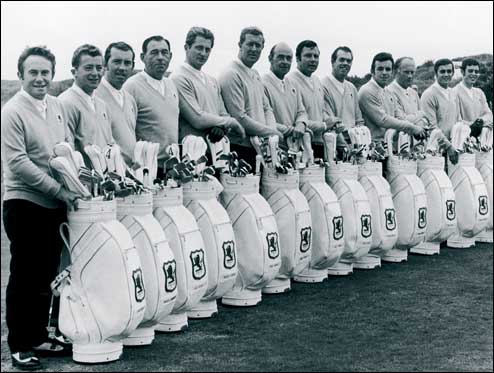
Tony Jacklin – Captain Fantastic
What do you remember of that 1969 match?
It was fascinating. Eric Brown was our captain and he announced on the first day that if one of the oppo’s ball goes in the rough under no circumstance should you help them look for it. I was thinking ‘f*** off, Eric’ I’m not about to approach it like that. But there was no love lost between him and Sam Snead [the American captain]. But you’ve got to remember these guys were hard cases and you tend to forget what tough nuts these old geezers were. They didn’t give a shit whether they talked to you or not, they’d been brought up tough. They saw any youngster as a spoilt brat. I guess every generation thinks the next one’s got more. When we came down 18 in that match Eric came up to me and said “You know what you’ve got to do” and I said [mimicking Browns Scottish accent] “yes I know what to do Eric” before I hit the second shot.
The million-dollar question: would you have made that putt?
Yes, I think so. I was at the top of my game and I was ready to make it. I knew I had to make it. I’m bloody glad I didn’t have to but I think I would have made it. I’d won the Open two months before, I’d beaten Jack 4&3 that morning – we played two series of singles on the Sunday in those days – and it really was only that long [holds his hands out approximately two feet apart]. The greens at Birkdale then may not have been quite in the same condition they were for the Open this past July, but I’d not had a yip at that stage. But the gesture was such that I didn’t have to. And I was relieved.
Designs on a second career
Following his recent collaboration with Jack Nicklaus on the much-lauded new ‘The Concession’ course in Florida, Europe’s most successful Ryder Cup captain has announced that he is extending his second career as a golf course designer with developers in the Middle East, continental Europe and the Caribbean. Jacklin, now 63, has made a conscious decision to concentrate on course design, and says he is taking a hands-on approach with his projects – which will bear all the hallmarks of the Open and US Open champion.
“I have decided only to take on a limited number of design contracts at any one time, as this gives me the opportunity to get personally and deeply involved in each of the projects,” he said at the opening of the Concession, a unique 5-star course near Sarasota that he designed in collaboration with Nicklaus. “I hope that my signature design courses will be my legacy in Europe, where I learned the game, made many friends and enjoyed many of my finest moments in the sport.”
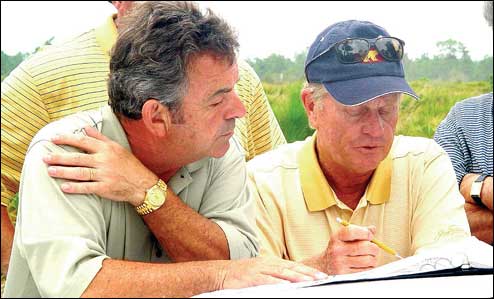
Tony Jacklin – Captain Fantastic
Jacklin is determined that each and every one of his Tony Jacklin Signature designed golf courses will be a very special place for golfers to learn the game, play and most of all enjoy their golf. His passion for golf, and his never-say-die spirit, has earned Tony a level of respect and admiration among European golfers that is unique and long-lasting and is destined to continue into his course design career.
Also on the drawing board is a project in Cypress. Jacklin, who remains the only post-war British or European golfer to have won both the Open and US Open, has been asked to replace the existing 18 holes at Secret Valley with two completely new 18-hole courses, thus forming a 36-hole complex integrated within the recently redesigned Venus Rock Golf Resort, just a 15-minute drive from the international airport and main town of Paphos.
Next door is Aphrodite Hills, south-eastern Europe’s first and, currently, only golf-integrated residential resort. Nearby are two similar quality-integrated resort developments spearheaded by Dolphin Capital Investors, the leading investor in the residential resort sector in south-eastern Europe. The Jacklin Design Group will work on the project in collaboration with Austrian architect, Hans-Georg Erhardt.
“I’m thrilled that The Concession has proved such a hit,” enthused Tony , “and I’m looking forward to creating a fantastic experience at Venus Rock. As I’m playing competitive golf less often now, I’ll be able to spend my time working with Hans-Georg Erhardt and the team at Aristo Developers to create something very special in Cyprus – a first-class golf complex that everyone can enjoy.”
Tony Jacklin – Captain Fantastic
Originally published in 2008